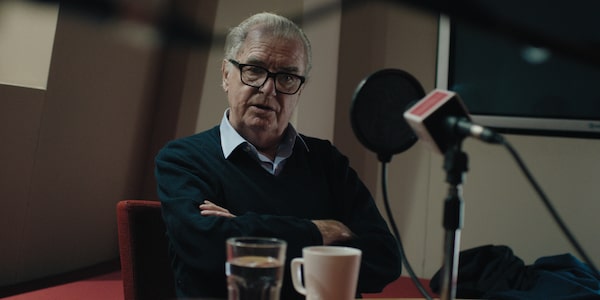
Lord Timothy Bell in Influence on CBC.
In her memoirs, Margaret Thatcher described a man named Timothy Bell, who later became Lord Bell, in these terms: “He could pick up quicker than anyone else a change in the national mood. And, unlike most advertising men, he understood that selling ideas is different from selling soap.”
Bell died last year and in none of the obituaries written is he described as the most wicked man in the world. But that is something you could conclude from a new documentary.
Influence (Thursday, CBC, 8 p.m. and on CBC Gem, part of the Hot Docs at Home strand) is about Bell’s career and consists of a lengthy interview with the man plus a canned version of his career in advertising and public relations. At 90 minutes, it feels a little too short because you realize Bell was involved with some of the most appalling dictators and scoundrels in recent world history.
Yes, he became famous, initially, for advising Thatcher on everything from political advertising to her clothing, speeches and speaking style. That’s when he was in the advertising racket. Then he founded his own firm, Bell Pottinger, which specialized in polishing the image of such people as General Augusto Pinochet; the President of Belarus Alexander Lukashenko; Asma al-Assad, the wife of the Syrian dictator; the Sultan of Brunei; and the Sri Lankan government during its war with the Tamils. His firm also earned many millions of pounds trying to convince the people of Iraq that everything was fine after the U.S.-led coalition invaded.

The documentary is framed around one strand of Bell’s life and career.
The doc is about one man, but really about a period in recent history in which “spin” has become something far more sinister than it used to be. Bell was one of the first to specialize in using data to predict and then influence the behaviour of voters. At one point, he’s described as “a geopolitical fixer,” which is accurate. If he was hired to influence a political situation, he had the skills to start street riots, influence media coverage or intimidate journalists and elect the seemingly unelectable.
Bell chats away for long periods in the documentary, telling yarns about his adventures, presumably on the assumption that he will come across as a charming rogue. He doesn’t. He tells the story of going to Chile and meeting the dictator Pinochet, armed with a letter of introduction from Thatcher, as if this was a funny story about the good old days. It isn’t. You know you’re looking at a malignancy.
The program is gripping, mind you, in a slightly terrifying way. Such is the sprawl of Bell’s influence on world events that you come to suspect everything you’ve understood about world events has been deeply misleading.
The documentary is framed around one strand of Bell’s life and career. When Bell was a boy, his father – a salesman – emigrated to what was then apartheid-era South Africa. Bell seems to admire the man. Three years ago, Bell Pottinger was closed down and Bell himself was a disgraced figure after it became clear his firm had engaged in inciting a race war in South Africa to benefit certain politicians and the Gupta brothers, the latter being accused of ransacking the country’s economy. It was South Africa that made his father a success and eventually ruined Bell himself.
It’s an extraordinary, eye-opening look at one man, but the documentary, written and directed by Diana Neille and Richard Poplak, is really about how the world works, in particular this world we live in now, presided over by populist nationalists such as Donald Trump and Boris Johnson.
Finally, this column continues with a “stay-at-home-period daily-streaming pick.” Today’s pick is Confirmation (Crave/HBO), a conscientious HBO movie that chronicles the highly charged hearings that preceded Justice Clarence Thomas’s appointment to the U.S. Supreme Court in 1991 – hearings that became toxic because of allegations of sexual harassment by Thomas that came from law professor Anita Hill. At first, watching this sober production, one is struck by how much has changed. The hearings were shown live on TV and the all-news channels devoted countless hours of debate to them. Thomas famously called his treatment a “high-tech lynching.” But they still used fax machines back then, there was no social media and even TV news seemed to move in slow motion compared with today’s speedy, instant news. As the story unfolds, what is striking is the timeless relevance of it. It’s a fine drama, with excellent performances from Wendell Pierce (The Wire and Treme) as Thomas and Kerry Washington as Anita Hill.
Plan your screen time with the weekly What to Watch newsletter. Sign up today.